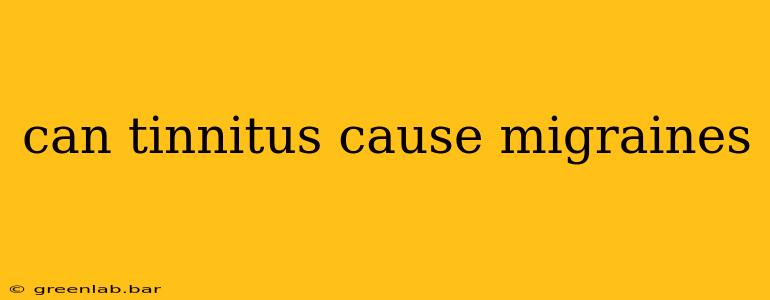Tinnitus, that persistent ringing, buzzing, or hissing in the ears, and migraines, those debilitating headaches often accompanied by nausea and visual disturbances, are both incredibly unpleasant conditions. But can one actually cause the other? The short answer is: it's complex, and the relationship isn't fully understood. While tinnitus doesn't directly cause migraines in the way a virus causes a cold, there's a strong correlation and several potential mechanisms linking the two.
The Overlapping Pathways: Why Tinnitus and Migraines Might Be Connected
Research suggests a significant overlap in the neurological pathways and underlying mechanisms involved in both tinnitus and migraines. This shared neural territory may explain why many individuals experience both conditions simultaneously. Here are some key factors:
1. Shared Brain Regions and Neurotransmitters:
Both tinnitus and migraine involve dysfunction in specific brain regions responsible for processing sensory information and pain. These include the auditory cortex (for tinnitus) and areas involved in pain perception and modulation (for migraines). Furthermore, imbalances in neurotransmitters like glutamate, serotonin, and dopamine, crucial for pain signaling and neural activity, are implicated in both conditions.
2. Hyperactivity in the Nervous System:
Tinnitus is often associated with increased neural activity in the auditory system, a kind of "hyper-excitability." Similarly, migraines are linked to heightened neural excitability in various brain regions. This shared feature suggests a potential underlying mechanism connecting the two.
3. Inflammation and Oxidative Stress:
Chronic inflammation and oxidative stress—an imbalance between free radicals and antioxidants—have been linked to both tinnitus and migraines. These processes can damage nerve cells and contribute to the development and persistence of both conditions.
4. Underlying Medical Conditions:
Certain medical conditions, such as temporomandibular joint (TMJ) disorder, head and neck injuries, and even sleep disorders, can contribute to both tinnitus and migraines. These conditions might trigger or exacerbate the symptoms of both.
Does Tinnitus Predispose to Migraines?
While a direct causal link isn't definitively established, evidence points towards tinnitus possibly increasing the risk of developing migraines, or vice versa. This correlation is particularly evident in individuals with chronic, persistent tinnitus. The constant auditory disturbance may lead to stress, sleep disruption, and increased tension, all of which are migraine triggers.
What to Do if You Experience Both Tinnitus and Migraines:
If you're experiencing both tinnitus and migraines, it's crucial to seek professional medical advice. A comprehensive evaluation by a healthcare professional is essential to determine the underlying causes and develop an appropriate treatment plan. This may involve:
- Neurological Examination: To assess the extent of neurological involvement and rule out other potential conditions.
- Audiological Evaluation: To determine the nature and severity of your tinnitus.
- Imaging Studies (e.g., MRI): To identify any structural abnormalities in the brain or inner ear.
- Lifestyle Modifications: Addressing potential triggers like stress, sleep disturbances, caffeine, and alcohol.
- Medication Management: Exploring medications for both tinnitus and migraine, depending on the specific needs and diagnosis.
- Therapy: Cognitive-behavioral therapy (CBT) and relaxation techniques can be helpful in managing the stress and anxiety associated with both conditions.
Conclusion: A Complex Interplay
The relationship between tinnitus and migraines is complex and multifaceted, involving shared neural pathways, neurotransmitter imbalances, and inflammatory processes. While tinnitus doesn't directly cause migraines, there's a strong correlation, and the presence of one condition may increase the risk of developing the other. Consulting with healthcare professionals is vital for accurate diagnosis, appropriate management, and improved quality of life for individuals suffering from both tinnitus and migraines. This article is for informational purposes only and does not constitute medical advice. Always seek the guidance of a qualified healthcare professional for any health concerns or before making any decisions related to your health or treatment.

